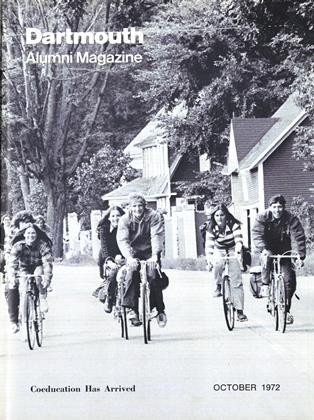By Royal B. Hassrick '39.New York: Vantage Press, Inc., 1972. 177pp. Illustrated. $4.50.
Hassrick's book I and Tex is dedicated to "AH the cattlemen who ever put their brand on a cow and to all the cowhands who helped make that possible." It is not, in other words, about "cowboys." The wider audience it reaches moves into Buck Ziegler's mind through the carefully understated, g-dropping language of a first-person narration: "I and Tex were drinkin' Old Bull's tin can beer on his big front porch. We always were invited for beer when we finished a mornin' of brandin'." (Why the reverse English of "I and Tex," "I and the Boss" is stressed is a little mystery in characterization since Buck turns out to have a background that would cut this out, unless it conveys an unconscious condescension to the cowhands addressed?).
The situations that involve Buck and Tex are almost uniformly humorous. But the knowledgeable cowhand who thinks shrewdly while he works, and who recounts wryly the necessary jobs performed slithering through mud or jouncing along in a pickup at the command of a self-important, shortsighted boss is the strength of the book.
In and out of the detailed realism of the narration some disconcerting scenario bits occur, however, like the request of the Boss's niece that Buck help her decide between two young men (" 'I'll tell you,' I said, 'all you have to do is figure out which one of those two boys' toothbrush you'd be willin' to share for a life-long pack trip'."); the statement to the woman he loves of why he wants to be "just an ordinary cowhand" (" 'l've got the prairie and the antelope and the great blue sky . . . fresh air to breathe and mountains to look at. . . . I'm footloose as a mustang, not fenced in like some tame gelding'."); and the rescue of his fellow cowhands through a chance of birth, astute business ventures, and willful non-conformism.
The illustrator distinguishes Buck from the other principal characters by drawing him in suit coat and tie. Perhaps Buck's triumph is that of a fictional cowhand — one who rides the prairie, and owns it, too. And Buck's self-righteous prediction about the life of a woman who prefers security with a University of Wyoming English professor to uncertainty with a man who has chosen "a way of life," in the last conversation of the book, is after all something we might read as a characterization, not a glorification of a cowhand's point of view. If not, author Hassrick should let us know in a sequel to Iand Tex.
Ripley Hansen teaches American Literaturein. the Extension Program at the Universityof California at Riverside. During the summer she lives on a ranch in Montana.
 View Full Issue
View Full Issue
More From This Issue
-
 Feature
FeatureBetting man's choice: Dartmouth. Then Harvard, Columbia, Cornell
October 1972 -
 Feature
FeatureVerdict on the Dartmouth Institute: A-OK
October 1972 By ROBERT B. GRAHAM '40 -
 Feature
FeatureCoeducation Becomes A Reality
October 1972 By MARY ROSS -
 Feature
FeatureHanover's "Host with the Most"
October 1972 By JAMES L. FARLEY '42 -
 Feature
FeatureHomage to the great god Pigskin: One hundred years of Ivy rivalry
October 1972 -
 Feature
FeatureNew Facilities in the Making
October 1972
Books
-
 Books
BooksGENERAL EDUCATION IN THE SOCIAL STUDIES
February 1949 By Albert S. Anthony. -
 Books
BooksAssaying the Market
November 1975 By DONALD F. SAWYER '21 -
 Books
BooksTHE METHODS OF DR. SCARLETT
October 1937 By Franklin Mcduffee'21 -
 Books
BooksCOLLEGE CHEMISTRY.
November 1956 By HENRY H. BAKER, JR. '29 -
 Books
BooksWINDOW IN THE SEA.
December 1956 By JOHN HURD '21 -
 Books
BooksABOUT THOSE ROSES or HOW NOT TO DO A PLAY AND SUCCEED and the Text of THE SUBJECT WAS ROSES.
JUNE 1965 By PAINE KNICKERBOCKER '33

